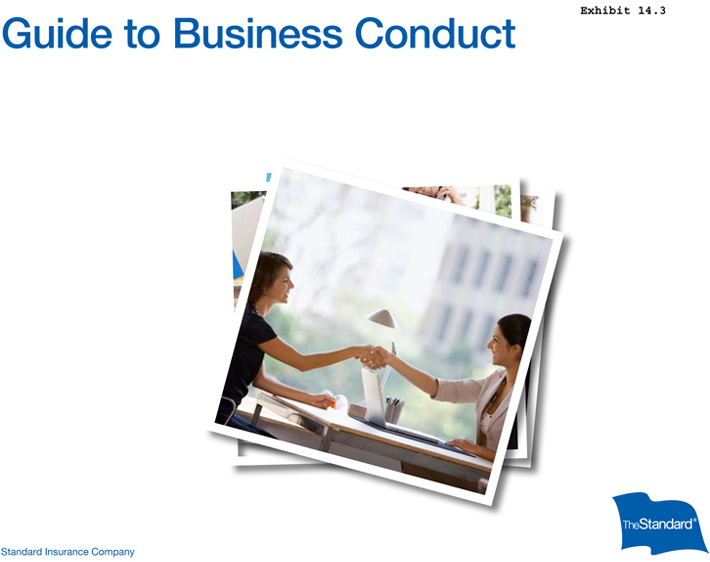
Exhibit 14.3
Guide to Business Conduct
Standard Insurance Company
TheStandard
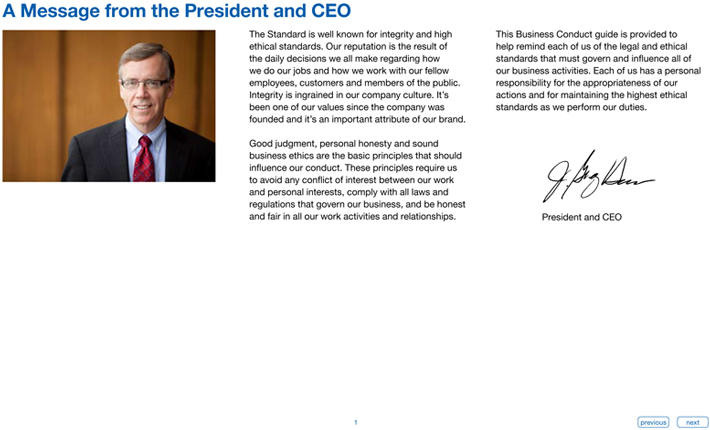
A Message from the President and CEO
The Standard is well known for integrity and high ethical standards. Our reputation is the result of the daily decisions we all make regarding how we do our jobs and how we work with our fellow employees, customers and members of the public. Integrity is ingrained in our company culture. It’s been one of our values since the company was founded and it’s an important attribute of our brand.
Good judgment, personal honesty and sound business ethics are the basic principles that should influence our conduct. These principles require us to avoid any conflict of interest between our work and personal interests, comply with all laws and regulations that govern our business, and be honest and fair in all our work activities and relationships.
This Business Conduct guide is provided to help remind each of us of the legal and ethical standards that must govern and influence all of our business activities. Each of us has a personal responsibility for the appropriateness of our actions and for maintaining the highest ethical standards as we perform our duties.
President and CEO
previous next
1
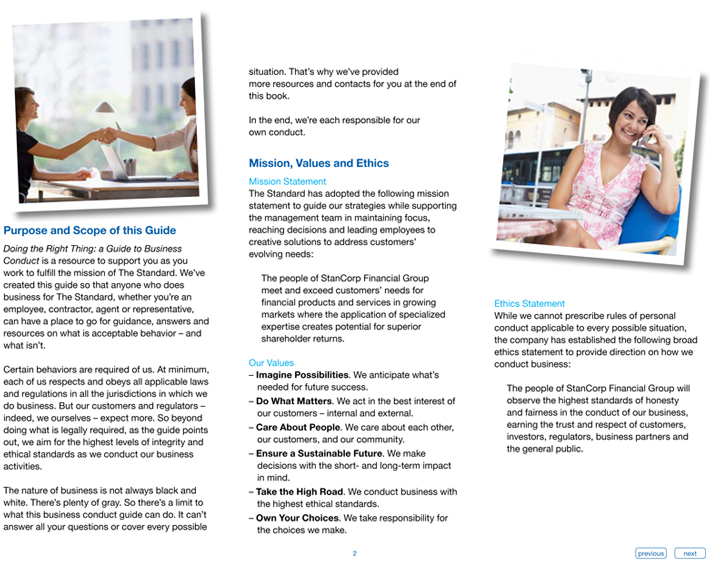
Purpose and Scope of this Guide
Doing the Right Thing: a Guide to Business Conduct is a resource to support you as you work to fulfill the mission of The Standard. We’ve created this guide so that anyone who does business for The Standard, whether you’re an employee, contractor, agent or representative, can have a place to go for guidance, answers and resources on what is acceptable behavior – and what isn’t.
Certain behaviors are required of us. At minimum, each of us respects and obeys all applicable laws and regulations in all the jurisdictions in which we do business. But our customers and regulators – indeed, we ourselves – expect more. So beyond doing what is legally required, as the guide points out, we aim for the highest levels of integrity and ethical standards as we conduct our business activities.
The nature of business is not always black and white. There’s plenty of gray. So there’s a limit to what this business conduct guide can do. It can’t answer all your questions or cover every possible situation. That’s why we’ve provided more resources and contacts for you at the end of this book.
In the end, we’re each responsible for our own conduct.
Mission, Values and Ethics
Mission Statement
The Standard has adopted the following mission statement to guide our strategies while supporting the management team in maintaining focus, reaching decisions and leading employees to creative solutions to address customers’ evolving needs:
The people of StanCorp Financial Group meet and exceed customers’ needs for financial products and services in growing markets where the application of specialized expertise creates potential for superior shareholder returns.
Our Values
– Imagine Possibilities. We anticipate what’s needed for future success.
– Do What Matters. We act in the best interest of our customers – internal and external.
– Care About People. We care about each other, our customers, and our community.
– Ensure a Sustainable Future. We make decisions with the short- and long-term impact in mind.
– Take the High Road. We conduct business with the highest ethical standards.
– Own Your Choices. We take responsibility for the choices we make.
Ethics Statement
While we cannot prescribe rules of personal conduct applicable to every possible situation, the company has established the following broad ethics statement to provide direction on how we conduct business:
The people of StanCorp Financial Group will observe the highest standards of honesty and fairness in the conduct of our business, earning the trust and respect of customers, investors, regulators, business partners and the general public.
previous next
2
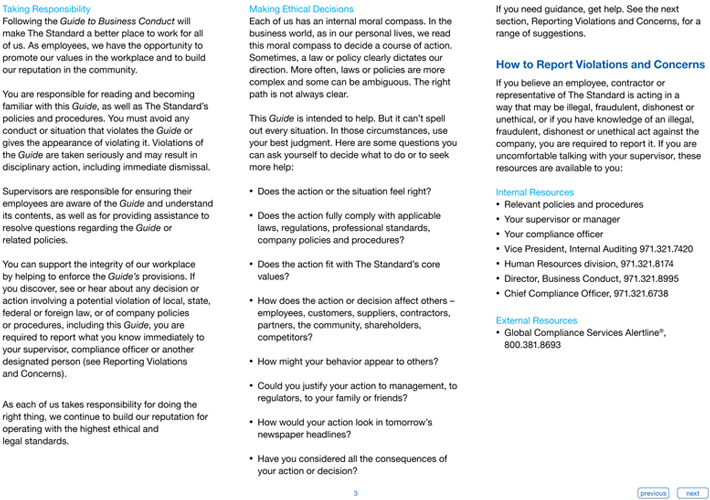
Taking Responsibility
Following the Guide to Business Conduct will make The Standard a better place to work for all of us. As employees, we have the opportunity to promote our values in the workplace and to build our reputation in the community.
You are responsible for reading and becoming familiar with this Guide, as well as The Standard’s policies and procedures. You must avoid any conduct or situation that violates the Guide or gives the appearance of violating it. Violations of the Guide are taken seriously and may result in disciplinary action, including immediate dismissal.
Supervisors are responsible for ensuring their employees are aware of the Guide and understand its contents, as well as for providing assistance to resolve questions regarding the Guide or related policies.
You can support the integrity of our workplace by helping to enforce the Guide’s provisions. If you discover, see or hear about any decision or action involving a potential violation of local, state, federal or foreign law, or of company policies or procedures, including this Guide, you are required to report what you know immediately to your supervisor, compliance officer or another designated person (see Reporting Violations and Concerns).
As each of us takes responsibility for doing the right thing, we continue to build our reputation for operating with the highest ethical and legal standards.
Making Ethical Decisions
Each of us has an internal moral compass. In the business world, as in our personal lives, we read this moral compass to decide a course of action. Sometimes, a law or policy clearly dictates our direction. More often, laws or policies are more complex and some can be ambiguous. The right path is not always clear.
This Guide is intended to help. But it can’t spell out every situation. In those circumstances, use your best judgment. Here are some questions you can ask yourself to decide what to do or to seek more help:
• Does the action or the situation feel right?
• Does the action fully comply with applicable laws, regulations, professional standards, company policies and procedures?
• Does the action fit with The Standard’s core values?
• How does the action or decision affect others – employees, customers, suppliers, contractors, partners, the community, shareholders, competitors?
• How might your behavior appear to others?
• Could you justify your action to management, to regulators, to your family or friends?
• How would your action look in tomorrow’s newspaper headlines?
• Have you considered all the consequences of your action or decision?
If you need guidance, get help. See the next section, Reporting Violations and Concerns, for a range of suggestions.
How to Report Violations and Concerns
If you believe an employee, contractor or representative of The Standard is acting in a way that may be illegal, fraudulent, dishonest or unethical, or if you have knowledge of an illegal, fraudulent, dishonest or unethical act against the company, you are required to report it. If you are uncomfortable talking with your supervisor, these resources are available to you:
Internal Resources
• Relevant policies and procedures
• Your supervisor or manager
• Your compliance officer
• Vice President, Internal Auditing 971.321.7420
• Human Resources division, 971.321.8174
• Director, Business Conduct, 971.321.8995
• Chief Compliance Officer, 971.321.6738
External Resources
• Global Compliance Services Alertline®,
800.381.8693
previous next
3
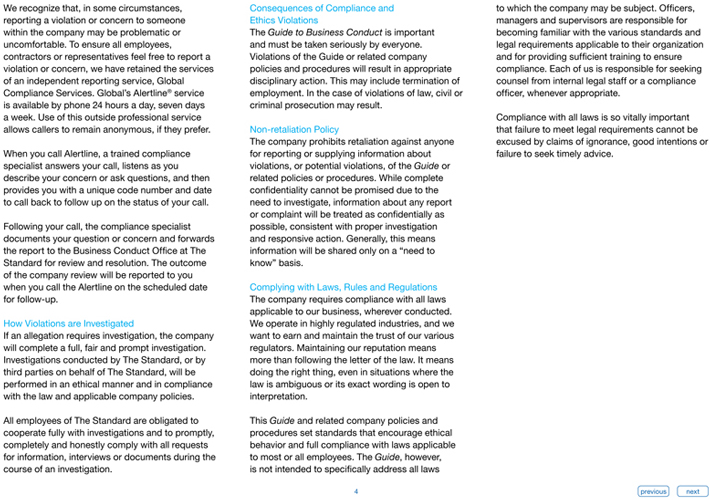
We recognize that, in some circumstances, reporting a violation or concern to someone within the company may be problematic or uncomfortable. To ensure all employees, contractors or representatives feel free to report a violation or concern, we have retained the services of an independent reporting service, Global Compliance Services. Global’s Alertline® service is available by phone 24 hours a day, seven days a week. Use of this outside professional service allows callers to remain anonymous, if they prefer.
When you call Alertline, a trained compliance specialist answers your call, listens as you describe your concern or ask questions, and then provides you with a unique code number and date to call back to follow up on the status of your call.
Following your call, the compliance specialist documents your question or concern and forwards the report to the Business Conduct Office at The Standard for review and resolution. The outcome of the company review will be reported to you when you call the Alertline on the scheduled date for follow-up.
How Violations are Investigated
If an allegation requires investigation, the company will complete a full, fair and prompt investigation. Investigations conducted by The Standard, or by third parties on behalf of The Standard, will be performed in an ethical manner and in compliance with the law and applicable company policies.
All employees of The Standard are obligated to cooperate fully with investigations and to promptly, completely and honestly comply with all requests for information, interviews or documents during the course of an investigation.
Consequences of Compliance and Ethics Violations
The Guide to Business Conduct is important and must be taken seriously by everyone. Violations of the Guide or related company policies and procedures will result in appropriate disciplinary action. This may include termination of employment. In the case of violations of law, civil or criminal prosecution may result.
Non-retaliation Policy
The company prohibits retaliation against anyone for reporting or supplying information about violations, or potential violations, of the Guide or related policies or procedures. While complete confidentiality cannot be promised due to the need to investigate, information about any report or complaint will be treated as confidentially as possible, consistent with proper investigation and responsive action. Generally, this means information will be shared only on a “need to know” basis.
Complying with Laws, Rules and Regulations
The company requires compliance with all laws applicable to our business, wherever conducted. We operate in highly regulated industries, and we want to earn and maintain the trust of our various regulators. Maintaining our reputation means more than following the letter of the law. It means doing the right thing, even in situations where the law is ambiguous or its exact wording is open to interpretation.
This Guide and related company policies and procedures set standards that encourage ethical behavior and full compliance with laws applicable to most or all employees. The Guide, however, is not intended to specifically address all laws to which the company may be subject. Officers, managers and supervisors are responsible for becoming familiar with the various standards and legal requirements applicable to their organization and for providing sufficient training to ensure compliance. Each of us is responsible for seeking counsel from internal legal staff or a compliance officer, whenever appropriate.
Compliance with all laws is so vitally important that failure to meet legal requirements cannot be excused by claims of ignorance, good intentions or failure to seek timely advice.
previous next
4
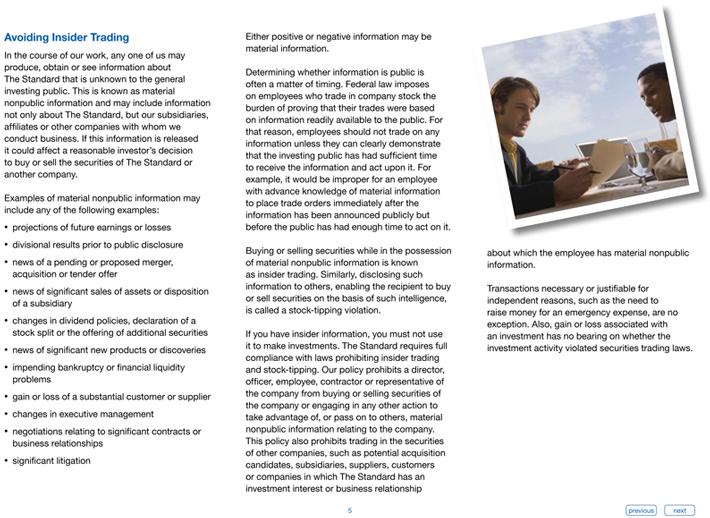
Avoiding Insider Trading
In the course of our work, any one of us may produce, obtain or see information about The Standard that is unknown to the general investing public. This is known as material nonpublic information and may include information not only about The Standard, but our subsidiaries, affiliates or other companies with whom we conduct business. If this information is released it could affect a reasonable investor’s decision to buy or sell the securities of The Standard or another company.
Examples of material nonpublic information may include any of the following examples:
• projections of future earnings or losses
• divisional results prior to public disclosure
• news of a pending or proposed merger, acquisition or tender offer
• news of significant sales of assets or disposition of a subsidiary
• changes in dividend policies, declaration of a stock split or the offering of additional securities
• news of significant new products or discoveries
• impending bankruptcy or financial liquidity problems
• gain or loss of a substantial customer or supplier
• changes in executive management
• negotiations relating to significant contracts or business relationships
• significant litigation
Either positive or negative information may be material information.
Determining whether information is public is often a matter of timing. Federal law imposes on employees who trade in company stock the burden of proving that their trades were based on information readily available to the public. For that reason, employees should not trade on any information unless they can clearly demonstrate that the investing public has had sufficient time to receive the information and act upon it. For example, it would be improper for an employee with advance knowledge of material information to place trade orders immediately after the information has been announced publicly but before the public has had enough time to act on it.
Buying or selling securities while in the possession of material nonpublic information is known as insider trading. Similarly, disclosing such information to others, enabling the recipient to buy or sell securities on the basis of such intelligence, is called a stock-tipping violation.
If you have insider information, you must not use it to make investments. The Standard requires full compliance with laws prohibiting insider trading and stock-tipping. Our policy prohibits a director, officer, employee, contractor or representative of the company from buying or selling securities of the company or engaging in any other action to take advantage of, or pass on to others, material nonpublic information relating to the company. This policy also prohibits trading in the securities of other companies, such as potential acquisition candidates, subsidiaries, suppliers, customers or companies in which The Standard has an investment interest or business relationship about which the employee has material nonpublic information.
Transactions necessary or justifiable for independent reasons, such as the need to raise money for an emergency expense, are no exception. Also, gain or loss associated with an investment has no bearing on whether the investment activity violated securities trading laws.
previous next
5
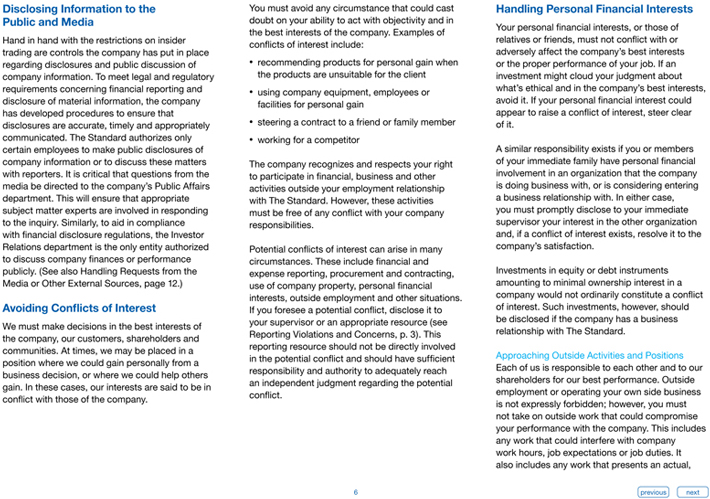
Disclosing Information to the Public and Media
Hand in hand with the restrictions on insider trading are controls the company has put in place regarding disclosures and public discussion of company information. To meet legal and regulatory requirements concerning financial reporting and disclosure of material information, the company has developed procedures to ensure that disclosures are accurate, timely and appropriately communicated. The Standard authorizes only certain employees to make public disclosures of company information or to discuss these matters with reporters. It is critical that questions from the media be directed to the company’s Public Affairs department. This will ensure that appropriate subject matter experts are involved in responding to the inquiry. Similarly, to aid in compliance with financial disclosure regulations, the Investor Relations department is the only entity authorized to discuss company finances or performance publicly. (See also Handling Requests from the Media or Other External Sources, page 12.)
Avoiding Conflicts of Interest
We must make decisions in the best interests of the company, our customers, shareholders and communities. At times, we may be placed in a position where we could gain personally from a business decision, or where we could help others gain. In these cases, our interests are said to be in conflict with those of the company.
You must avoid any circumstance that could cast doubt on your ability to act with objectivity and in the best interests of the company. Examples of conflicts of interest include:
• recommending products for personal gain when the products are unsuitable for the client
• using company equipment, employees or facilities for personal gain
• steering a contract to a friend or family member
• working for a competitor
The company recognizes and respects your right to participate in financial, business and other activities outside your employment relationship with The Standard. However, these activities must be free of any conflict with your company responsibilities.
Potential conflicts of interest can arise in many circumstances. These include financial and expense reporting, procurement and contracting, use of company property, personal financial interests, outside employment and other situations. If you foresee a potential conflict, disclose it to your supervisor or an appropriate resource (see Reporting Violations and Concerns, p. 3). This reporting resource should not be directly involved in the potential conflict and should have sufficient responsibility and authority to adequately reach an independent judgment regarding the potential conflict.
Handling Personal Financial Interests
Your personal financial interests, or those of relatives or friends, must not conflict with or adversely affect the company’s best interests or the proper performance of your job. If an investment might cloud your judgment about what’s ethical and in the company’s best interests, avoid it. If your personal financial interest could appear to raise a conflict of interest, steer clear of it.
A similar responsibility exists if you or members of your immediate family have personal financial involvement in an organization that the company is doing business with, or is considering entering a business relationship with. In either case, you must promptly disclose to your immediate supervisor your interest in the other organization and, if a conflict of interest exists, resolve it to the company’s satisfaction.
Investments in equity or debt instruments amounting to minimal ownership interest in a company would not ordinarily constitute a conflict of interest. Such investments, however, should be disclosed if the company has a business relationship with The Standard.
Approaching Outside Activities and Positions Each of us is responsible to each other and to our shareholders for our best performance. Outside employment or operating your own side business is not expressly forbidden; however, you must not take on outside work that could compromise your performance with the company. This includes any work that could interfere with company work hours, job expectations or job duties. It also includes any work that presents an actual,
previous next
6
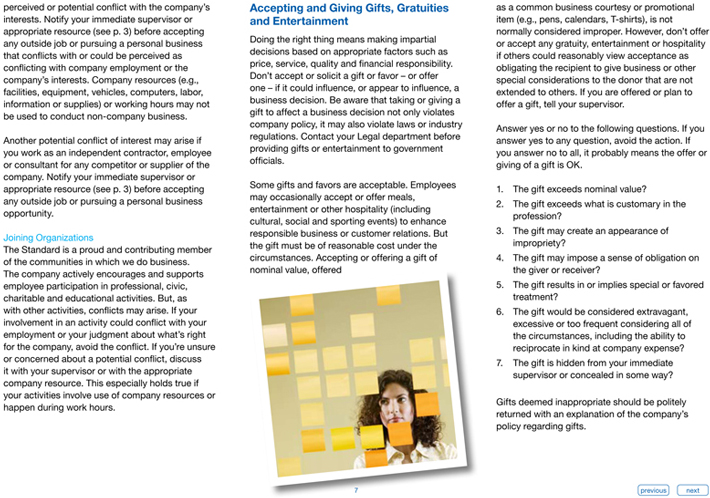
perceived or potential conflict with the company’s interests. Notify your immediate supervisor or appropriate resource (see p. 3) before accepting any outside job or pursuing a personal business that conflicts with or could be perceived as conflicting with company employment or the company’s interests. Company resources (e.g., facilities, equipment, vehicles, computers, labor, information or supplies) or working hours may not be used to conduct non-company business.
Another potential conflict of interest may arise if you work as an independent contractor, employee or consultant for any competitor or supplier of the company. Notify your immediate supervisor or appropriate resource (see p. 3) before accepting any outside job or pursuing a personal business opportunity.
Joining Organizations
The Standard is a proud and contributing member of the communities in which we do business. The company actively encourages and supports employee participation in professional, civic, charitable and educational activities. But, as with other activities, conflicts may arise. If your involvement in an activity could conflict with your employment or your judgment about what’s right for the company, avoid the conflict. If you’re unsure or concerned about a potential conflict, discuss it with your supervisor or with the appropriate company resource. This especially holds true if your activities involve use of company resources or happen during work hours.
Accepting and Giving Gifts, Gratuities and Entertainment
Doing the right thing means making impartial decisions based on appropriate factors such as price, service, quality and financial responsibility. Don’t accept or solicit a gift or favor – or offer one – if it could influence, or appear to influence, a business decision. Be aware that taking or giving a gift to affect a business decision not only violates company policy, it may also violate laws or industry regulations. Contact your Legal department before providing gifts or entertainment to government officials.
Some gifts and favors are acceptable. Employees may occasionally accept or offer meals, entertainment or other hospitality (including cultural, social and sporting events) to enhance responsible business or customer relations. But the gift must be of reasonable cost under the circumstances. Accepting or offering a gift of nominal value, offered as a common business courtesy or promotional item (e.g., pens, calendars, T-shirts), is not normally considered improper. However, don’t offer or accept any gratuity, entertainment or hospitality if others could reasonably view acceptance as obligating the recipient to give business or other special considerations to the donor that are not extended to others. If you are offered or plan to offer a gift, tell your supervisor.
Answer yes or no to the following questions. If you answer yes to any question, avoid the action. If you answer no to all, it probably means the offer or giving of a gift is OK.
1. The gift exceeds nominal value?
2. The gift exceeds what is customary in the profession?
3. The gift may create an appearance of impropriety?
4. The gift may impose a sense of obligation on the giver or receiver?
5. The gift results in or implies special or favored treatment?
6. The gift would be considered extravagant, excessive or too frequent considering all of the circumstances, including the ability to reciprocate in kind at company expense?
7. The gift is hidden from your immediate supervisor or concealed in some way?
Gifts deemed inappropriate should be politely returned with an explanation of the company’s policy regarding gifts.
previous next
7
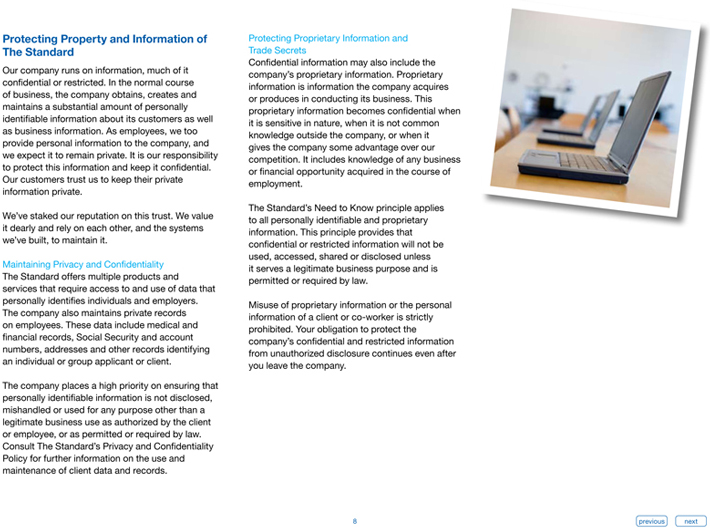
Protecting Property and Information of The Standard
Our company runs on information, much of it confidential or restricted. In the normal course of business, the company obtains, creates and maintains a substantial amount of personally identifiable information about its customers as well as business information. As employees, we too provide personal information to the company, and we expect it to remain private. It is our responsibility to protect this information and keep it confidential. Our customers trust us to keep their private information private.
We’ve staked our reputation on this trust. We value it dearly and rely on each other, and the systems we’ve built, to maintain it.
Maintaining Privacy and Confidentiality
The Standard offers multiple products and services that require access to and use of data that personally identifies individuals and employers. The company also maintains private records on employees. These data include medical and financial records, Social Security and account numbers, addresses and other records identifying an individual or group applicant or client.
The company places a high priority on ensuring that personally identifiable information is not disclosed, mishandled or used for any purpose other than a legitimate business use as authorized by the client or employee, or as permitted or required by law. Consult The Standard’s Privacy and Confidentiality Policy for further information on the use and maintenance of client data and records.
Protecting Proprietary Information and Trade Secrets
Confidential information may also include the company’s proprietary information. Proprietary information is information the company acquires or produces in conducting its business. This proprietary information becomes confidential when it is sensitive in nature, when it is not common knowledge outside the company, or when it gives the company some advantage over our competition. It includes knowledge of any business or financial opportunity acquired in the course of employment.
The Standard’s Need to Know principle applies to all personally identifiable and proprietary information. This principle provides that confidential or restricted information will not be used, accessed, shared or disclosed unless it serves a legitimate business purpose and is permitted or required by law.
Misuse of proprietary information or the personal information of a client or co-worker is strictly prohibited. Your obligation to protect the company’s confidential and restricted information from unauthorized disclosure continues even after you leave the company.
previous next
8
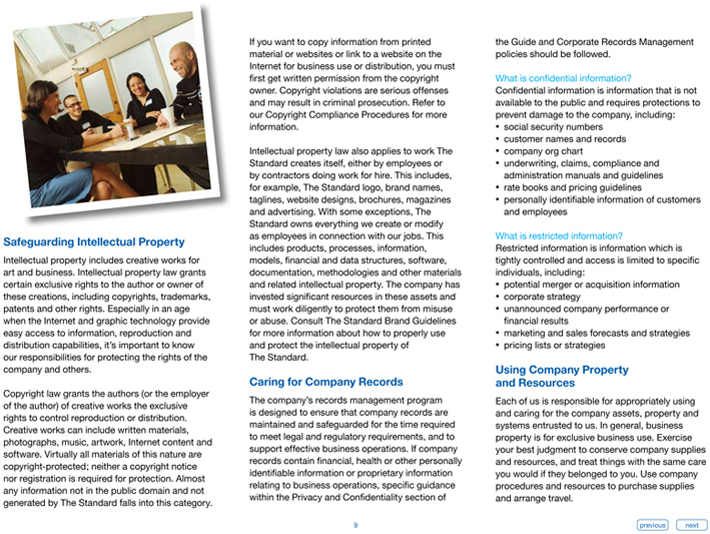
Safeguarding Intellectual Property
Intellectual property includes creative works for art and business. Intellectual property law grants certain exclusive rights to the author or owner of these creations, including copyrights, trademarks, patents and other rights. Especially in an age when the Internet and graphic technology provide easy access to information, reproduction and distribution capabilities, it’s important to know our responsibilities for protecting the rights of the company and others.
Copyright law grants the authors (or the employer of the author) of creative works the exclusive rights to control reproduction or distribution. Creative works can include written materials, photographs, music, artwork, Internet content and software. Virtually all materials of this nature are copyright-protected; neither a copyright notice nor registration is required for protection. Almost any information not in the public domain and not generated by The Standard falls into this category.
If you want to copy information from printed material or websites or link to a website on the Internet for business use or distribution, you must first get written permission from the copyright owner. Copyright violations are serious offenses and may result in criminal prosecution. Refer to our Copyright Compliance Procedures for more information.
Intellectual property law also applies to work The Standard creates itself, either by employees or by contractors doing work for hire. This includes, for example, The Standard logo, brand names, taglines, website designs, brochures, magazines and advertising. With some exceptions, The Standard owns everything we create or modify as employees in connection with our jobs. This includes products, processes, information, models, financial and data structures, software, documentation, methodologies and other materials and related intellectual property. The company has invested significant resources in these assets and must work diligently to protect them from misuse or abuse. Consult The Standard Brand Guidelines for more information about how to properly use and protect the intellectual property of The Standard.
Caring for Company Records
The company’s records management program is designed to ensure that company records are maintained and safeguarded for the time required to meet legal and regulatory requirements, and to support effective business operations. If company records contain financial, health or other personally identifiable information or proprietary information relating to business operations, specific guidance within the Privacy and Confidentiality section of the Guide and Corporate Records Management policies should be followed.
What is confidential information?
Confidential information is information that is not available to the public and requires protections to prevent damage to the company, including:
• social security numbers
• customer names and records
• company org chart
• underwriting, claims, compliance and administration manuals and guidelines
• rate books and pricing guidelines
• personally identifiable information of customers and employees
What is restricted information?
Restricted information is information which is tightly controlled and access is limited to specific individuals, including:
• potential merger or acquisition information
• corporate strategy
• unannounced company performance or financial results
• marketing and sales forecasts and strategies
• pricing lists or strategies
Using Company Property and Resources
Each of us is responsible for appropriately using and caring for the company assets, property and systems entrusted to us. In general, business property is for exclusive business use. Exercise your best judgment to conserve company supplies and resources, and treat things with the same care you would if they belonged to you. Use company procedures and resources to purchase supplies and arrange travel.
previous next
9
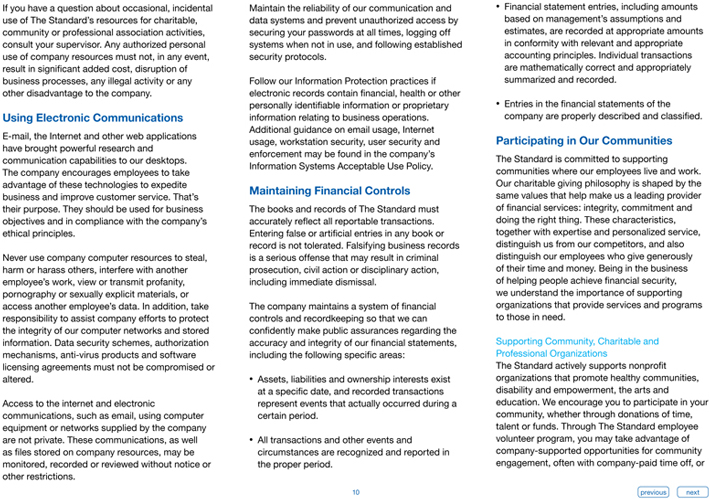
If you have a question about occasional, incidental use of The Standard’s resources for charitable, community or professional association activities, consult your supervisor. Any authorized personal use of company resources must not, in any event, result in significant added cost, disruption of business processes, any illegal activity or any other disadvantage to the company.
Using Electronic Communications
E-mail, the Internet and other web applications have brought powerful research and communication capabilities to our desktops. The company encourages employees to take advantage of these technologies to expedite business and improve customer service. That’s their purpose. They should be used for business objectives and in compliance with the company’s ethical principles.
Never use company computer resources to steal, harm or harass others, interfere with another employee’s work, view or transmit profanity, pornography or sexually explicit materials, or access another employee’s data. In addition, take responsibility to assist company efforts to protect the integrity of our computer networks and stored information. Data security schemes, authorization mechanisms, anti-virus products and software licensing agreements must not be compromised or altered.
Access to the internet and electronic communications, such as email, using computer equipment or networks supplied by the company are not private. These communications, as well as files stored on company resources, may be monitored, recorded or reviewed without notice or other restrictions.
Maintain the reliability of our communication and data systems and prevent unauthorized access by securing your passwords at all times, logging off systems when not in use, and following established security protocols.
Follow our Information Protection practices if electronic records contain financial, health or other personally identifiable information or proprietary information relating to business operations. Additional guidance on email usage, Internet usage, workstation security, user security and enforcement may be found in the company’s Information Systems Acceptable Use Policy.
Maintaining Financial Controls
The books and records of The Standard must accurately reflect all reportable transactions. Entering false or artificial entries in any book or record is not tolerated. Falsifying business records is a serious offense that may result in criminal prosecution, civil action or disciplinary action, including immediate dismissal.
The company maintains a system of financial controls and recordkeeping so that we can confidently make public assurances regarding the accuracy and integrity of our financial statements, including the following specific areas:
• Assets, liabilities and ownership interests exist at a specific date, and recorded transactions represent events that actually occurred during a certain period.
• All transactions and other events and circumstances are recognized and reported in the proper period.
• Financial statement entries, including amounts based on management’s assumptions and estimates, are recorded at appropriate amounts in conformity with relevant and appropriate accounting principles. Individual transactions are mathematically correct and appropriately summarized and recorded.
• Entries in the financial statements of the company are properly described and classified.
Participating in Our Communities
The Standard is committed to supporting communities where our employees live and work. Our charitable giving philosophy is shaped by the same values that help make us a leading provider of financial services: integrity, commitment and doing the right thing. These characteristics, together with expertise and personalized service, distinguish us from our competitors, and also distinguish our employees who give generously of their time and money. Being in the business of helping people achieve financial security, we understand the importance of supporting organizations that provide services and programs to those in need.
Supporting Community, Charitable and Professional Organizations The Standard actively supports nonprofit organizations that promote healthy communities, disability and empowerment, the arts and education. We encourage you to participate in your community, whether through donations of time, talent or funds. Through The Standard employee volunteer program, you may take advantage of company-supported opportunities for community engagement, often with company-paid time off, or
previous next
10
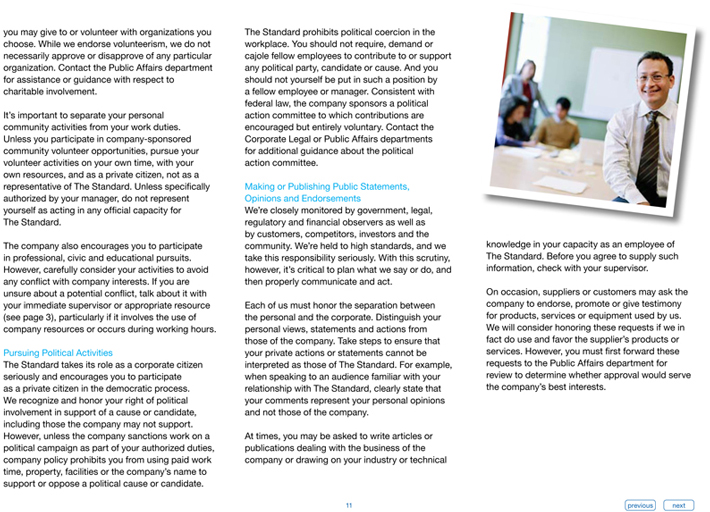
you may give to or volunteer with organizations you choose. While we endorse volunteerism, we do not necessarily approve or disapprove of any particular organization. Contact the Public Affairs department for assistance or guidance with respect to charitable involvement.
It’s important to separate your personal community activities from your work duties. Unless you participate in company-sponsored community volunteer opportunities, pursue your volunteer activities on your own time, with your own resources, and as a private citizen, not as a representative of The Standard. Unless specifically authorized by your manager, do not represent yourself as acting in any official capacity for The Standard.
The company also encourages you to participate in professional, civic and educational pursuits. However, carefully consider your activities to avoid any conflict with company interests. If you are unsure about a potential conflict, talk about it with your immediate supervisor or appropriate resource (see page 3), particularly if it involves the use of company resources or occurs during working hours.
Pursuing Political Activities
The Standard takes its role as a corporate citizen seriously and encourages you to participate as a private citizen in the democratic process. We recognize and honor your right of political involvement in support of a cause or candidate, including those the company may not support. However, unless the company sanctions work on a political campaign as part of your authorized duties, company policy prohibits you from using paid work time, property, facilities or the company’s name to support or oppose a political cause or candidate.
The Standard prohibits political coercion in the workplace. You should not require, demand or cajole fellow employees to contribute to or support any political party, candidate or cause. And you should not yourself be put in such a position by a fellow employee or manager. Consistent with federal law, the company sponsors a political action committee to which contributions are encouraged but entirely voluntary. Contact the Corporate Legal or Public Affairs departments for additional guidance about the political action committee.
Making or Publishing Public Statements, Opinions and Endorsements
We’re closely monitored by government, legal, regulatory and financial observers as well as by customers, competitors, investors and the community. We’re held to high standards, and we take this responsibility seriously. With this scrutiny, however, it’s critical to plan what we say or do, and then properly communicate and act.
Each of us must honor the separation between the personal and the corporate. Distinguish your personal views, statements and actions from those of the company. Take steps to ensure that your private actions or statements cannot be interpreted as those of The Standard. For example, when speaking to an audience familiar with your relationship with The Standard, clearly state that your comments represent your personal opinions and not those of the company.
At times, you may be asked to write articles or publications dealing with the business of the company or drawing on your industry or technical knowledge in your capacity as an employee of The Standard. Before you agree to supply such information, check with your supervisor.
On occasion, suppliers or customers may ask the company to endorse, promote or give testimony for products, services or equipment used by us. We will consider honoring these requests if we in fact do use and favor the supplier’s products or services. However, you must first forward these requests to the Public Affairs department for review to determine whether approval would serve the company’s best interests.
previous next
11
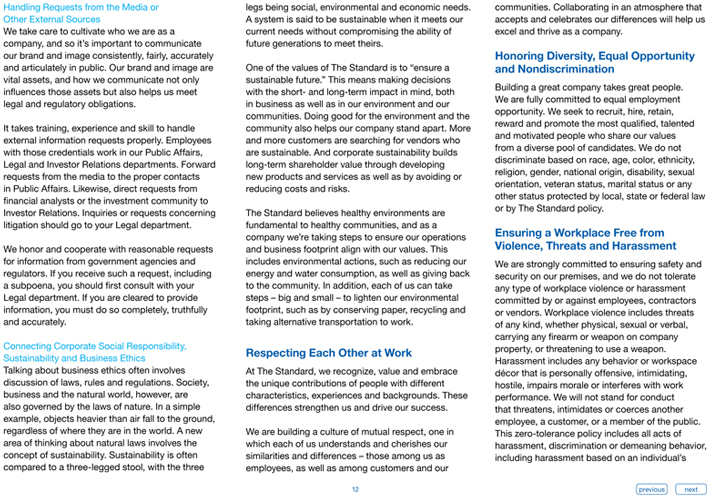
Handling Requests from the Media or Other External Sources
We take care to cultivate who we are as a company, and so it’s important to communicate our brand and image consistently, fairly, accurately and articulately in public. Our brand and image are vital assets, and how we communicate not only influences those assets but also helps us meet legal and regulatory obligations.
It takes training, experience and skill to handle external information requests properly. Employees with those credentials work in our Public Affairs, Legal and Investor Relations departments. Forward requests from the media to the proper contacts in Public Affairs. Likewise, direct requests from financial analysts or the investment community to Investor Relations. Inquiries or requests concerning litigation should go to your Legal department.
We honor and cooperate with reasonable requests for information from government agencies and regulators. If you receive such a request, including a subpoena, you should first consult with your Legal department. If you are cleared to provide information, you must do so completely, truthfully and accurately.
Connecting Corporate Social Responsibility, Sustainability and Business Ethics
Talking about business ethics often involves discussion of laws, rules and regulations. Society, business and the natural world, however, are also governed by the laws of nature. In a simple example, objects heavier than air fall to the ground, regardless of where they are in the world. A new area of thinking about natural laws involves the concept of sustainability. Sustainability is often compared to a three-legged stool, with the three legs being social, environmental and economic needs. A system is said to be sustainable when it meets our current needs without compromising the ability of future generations to meet theirs.
One of the values of The Standard is to “ensure a sustainable future.” This means making decisions with the short- and long-term impact in mind, both in business as well as in our environment and our communities. Doing good for the environment and the community also helps our company stand apart. More and more customers are searching for vendors who are sustainable. And corporate sustainability builds long-term shareholder value through developing new products and services as well as by avoiding or reducing costs and risks.
The Standard believes healthy environments are fundamental to healthy communities, and as a company we’re taking steps to ensure our operations and business footprint align with our values. This includes environmental actions, such as reducing our energy and water consumption, as well as giving back to the community. In addition, each of us can take steps – big and small – to lighten our environmental footprint, such as by conserving paper, recycling and taking alternative transportation to work.
Respecting Each Other at Work
At The Standard, we recognize, value and embrace the unique contributions of people with different characteristics, experiences and backgrounds. These differences strengthen us and drive our success.
We are building a culture of mutual respect, one in which each of us understands and cherishes our similarities and differences – those among us as employees, as well as among customers and our communities. Collaborating in an atmosphere that accepts and celebrates our differences will help us excel and thrive as a company.
Honoring Diversity, Equal Opportunity and Nondiscrimination
Building a great company takes great people. We are fully committed to equal employment opportunity. We seek to recruit, hire, retain, reward and promote the most qualified, talented and motivated people who share our values from a diverse pool of candidates. We do not discriminate based on race, age, color, ethnicity, religion, gender, national origin, disability, sexual orientation, veteran status, marital status or any other status protected by local, state or federal law or by The Standard policy.
Ensuring a Workplace Free from Violence, Threats and Harassment
We are strongly committed to ensuring safety and security on our premises, and we do not tolerate any type of workplace violence or harassment committed by or against employees, contractors or vendors. Workplace violence includes threats of any kind, whether physical, sexual or verbal, carrying any firearm or weapon on company property, or threatening to use a weapon. Harassment includes any behavior or workspace décor that is personally offensive, intimidating, hostile, impairs morale or interferes with work performance. We will not stand for conduct that threatens, intimidates or coerces another employee, a customer, or a member of the public. This zero-tolerance policy includes all acts of harassment, discrimination or demeaning behavior, including harassment based on an individual’s
previous next
12
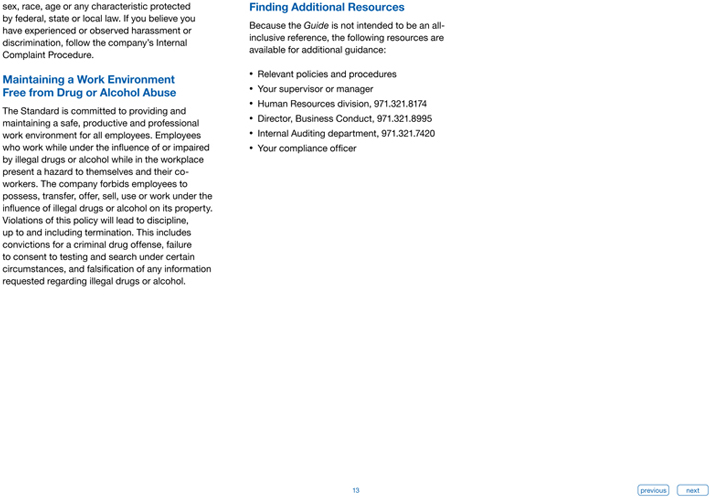
sex, race, age or any characteristic protected by federal, state or local law. If you believe you have experienced or observed harassment or discrimination, follow the company’s Internal Complaint Procedure.
Maintaining a Work Environment Free from Drug or Alcohol Abuse
The Standard is committed to providing and maintaining a safe, productive and professional work environment for all employees. Employees who work while under the influence of or impaired by illegal drugs or alcohol while in the workplace present a hazard to themselves and their co-workers. The company forbids employees to possess, transfer, offer, sell, use or work under the influence of illegal drugs or alcohol on its property. Violations of this policy will lead to discipline, up to and including termination. This includes convictions for a criminal drug offense, failure to consent to testing and search under certain circumstances, and falsification of any information requested regarding illegal drugs or alcohol.
Finding Additional Resources
Because the Guide is not intended to be an all-inclusive reference, the following resources are available for additional guidance:
• Relevant policies and procedures
• Your supervisor or manager
• Human Resources division, 971.321.8174
• Director, Business Conduct, 971.321.8995
• Internal Auditing department, 971.321.7420
• Your compliance officer
previous next
13

TheStandard
Standard Insurance Company
1100 SW Sixth Avenue
Portland OR 97204
www.standard.com
Guide to Business Conduct
SI 10973 (1/10)














